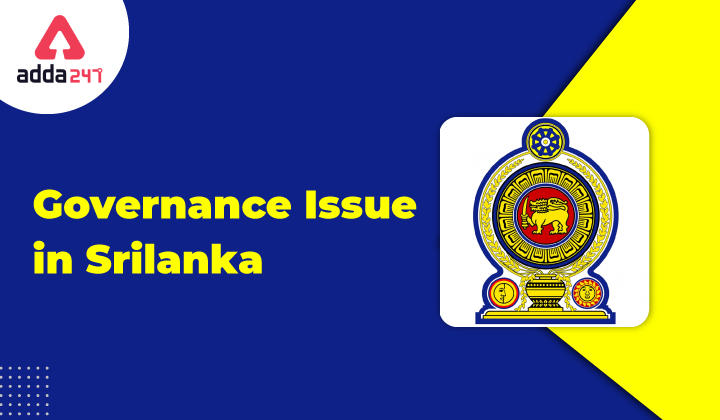GS Paper – 2: India and its Neighbourhood, Effect of Policies & Politics of Countries on India’s Interests
Context
Sri Lankan President Rajapaksa and his regime are facing a governance crisis and it has four interconnected dimensions — economic, social, governance, and legitimacy.
Background
While assuming office in 2019, Mr Rajapaksa’s promise was for a ‘strong government’ under a ‘strong leader’ to ensure national security, law and order, political stability, and victor’s peace with the ethnic minorities. But now due to the absence of any effective government interventions to alleviate economic hardships faced by the poor, the new poor produced by the pandemic, the working people and all strata of the middle class, both urban and rural, have a fresh social crisis too.

Policy Shift
- Soon after assuming office, the government launched a programme of restoring Sri Lanka’s personalised model of executive authoritarianism, which had been suspended by the previous government under the 19th Amendment to the Constitution.
- For this objective, Mr Rajapaksa made use of the public health emergency caused by the COVID-19 pandemic in early 2020.
- Bypassing the then Opposition-dominated Parliament, Mr Rajapaksa concentrated a great deal of financial and administrative power into his hands, thereby re-establishing the presidential executive as the central institution of state power.
- In October 2020, Mr Rajapaksa used the newly gained two-thirds parliamentary majority to abolish the 19th Amendment.
- Under the 20th Amendment, Sri Lanka was thus brought back to executive presidentialism, which has been the mainstay of Sri Lanka’s democratic decay for decades.
Civil-military ties
- As critics insist, militarisation of public administration is a key component of Mr Rajapaksa’s project of de-democratisation.
- He initiated a new trend in civil-military relations in Sri Lanka’s structures of governance.
- Appointed the army commander to head a new presidential task force to manage the public health crisis and placed the military over the politicians as well as medical and civilian professionals.
- In the new political and administrative order, serving and retired senior military officers are given key roles.
Covid Management
- Continuing failures and confusion in policymaking and implementation are at the heart of an ongoing governance crisis since the second wave of the COVID-19 pandemic, mid last year.
- Having been persuaded by nativist ideologues and local conspiracy theorists, President Rajapaksa initially de-emphasised the urgency of launching a rapid vaccination programme throughout the country.
- His encouragement of magic and sorcery to combat the pandemic put the public health policy into disarray.
- It is only after the pandemic had reached crisis proportions by the middle of this year that President Rajapaksa turned to science, expert advice and vaccination.
Economic Policy
- President’s ideologically-inspired decision to ban chemical fertilizers and inputs in all spheres of agriculture epitomises the Rajapaksa regime’s record of inept and autocratic approach to initiating an economic and social transformation.
- This inexplicably rash and inappropriate policy intervention has already caused much social unrest and discontent among very wide sections of the peasantry.
- Similarly, the recent mishandling of Sri Lanka’s chronic foreign exchange crisis, leading to further destabilisation of the country’s currency and economy, has caused fear among citizens that continuing economic policy failures might even trigger an economic collapse.
- The government’s repeated failures to intervene to bring the prices of essential consumer items down and manage the runaway cost of living, amidst uncertainties and confusion in policy decisions and their implementation,
Core Governance Failure issues
- Sri Lankan government’s apathy towards the suffering of the people.
- Rapidly declining income levels.
- An erosion of living standards and economic insecurity caused by a rampant economic and financial crisis is a serious failure in governance.
- The severity of the economic crisis has also made it impossible for President Rajapaksa to initiate a state-sponsored social support programme for the poor, the new poor and vulnerable segments of the people.
- Degree of insensitivity government display to the consequences of policy failures and the crisis of governance for people’s lives and their survival.
- It also constitutes the core of the legitimacy crisis the president has to deal with at the personal level as well.
International relations
- Current regime’s close proximity to China at the expense of Sri Lanka’s traditional allies and friends.
- Mending relations with India, Europe and America appear to be a recent policy shift.
Conclusion:
The poor governance in Sri Lanka is the accumulation of such failures at multiple levels of policy, governance, and leadership that has seriously eroded the popular support that Mr Rajapaksa enjoyed just two years ago. In this situation, a legitimate policy shift is needed for providing the citizens with an efficient, result-oriented, professionalised, technocratic governance.



 TSPSC Group 1 Question Paper 2024, Downl...
TSPSC Group 1 Question Paper 2024, Downl...
 TSPSC Group 1 Answer key 2024 Out, Downl...
TSPSC Group 1 Answer key 2024 Out, Downl...
 UPSC Prelims 2024 Question Paper, Downlo...
UPSC Prelims 2024 Question Paper, Downlo...




